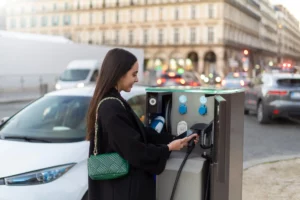
Home / EV Charging News / Ultimate Solution to EV Charging with Limited Power Supply
The world is taking on the climate change concerns, and electric vehicles (EVs) seem to be the most viable alternative to internal combustion engine (ICE) vehicles. The transport sector is reportedly the greatest contributor to greenhouse gas emissions—hence the ongoing shift to EVs.
However, it’s not a pretty smooth transition despite the popular revolution. Earlier reports indicate there will be about 145 million electric vehicles by 2030. The numbers could even hit 230 million if governments press on the climate and international energy goals, yet EV charging remains a little problematic.
First, there is limited electrical infrastructure in terms of electrical components and electricity grid. There are significant differences between electric vehicle components and ICE vehicles components. EVs use highly sophisticated electrical and electronic systems and software, and charge post manufacturers report to have encountered massive computer chip shortages.
The shortage is occasioned by COVID-19 related impacts on the supply chain, massively affecting the availability of EV charger components like CPUs and connectors. Charging points currently available are limited, unreliable, and often suffer problematic faults.
Also, there is the challenge of integrating chargers from multiple vendors and companies to provide EV charging stations that accommodate all vehicle models.
Second, the electricity grid challenges relate to the power supply. The electrification of the transport sector generally creates a high power demand. Therefore, businesses and private residences that want to install charging stations have a limited power supply.
Utility companies are challenged to flatten the demand curve to ensure a higher off-peak consumption and lower the workload during peak hours. Ideally, this can be achievable by following a time-based pricing model that significantly discourages EV owners from charging during peak hours.
Alternatively, they can upgrade the national transmission and distribution systems to accommodate the new power load. However, such upgrades would be quite expensive, to the tune of tens of thousands of dollars.
As a result, the ultimate answer lies in innovative solutions like Electric Vehicle Master Controller (EVMC). It is a safe and reliable EV charging solution that is several times cheaper than other available solutions. EVMC allows for substantial savings when installing many EV chargers and cuts on the monthly utility bill. It is easy to install, and no subscriptions are necessary.
EVMC can use existing electrical infrastructure and charge up to 4 times more electric vehicles using a single electrical line. Businesses can now install several charging stations and dedicate a single power source to provide the power, dramatically reducing the power infrastructure requirements.
Also, its ability to work with existing infrastructure means that labor costs and construction material costs are significantly reduced. Fewer wire, circuits, and conduit pipes will be required, hence more environmental benefits beyond reduced emissions.
Further, it is designed to work with a wide range of charging stations, including smart and non-networked dumb charging stations. That way, EVMC eliminates integration and compatibility challenges.
At the same time, the EV infrastructure management controller saves plenty of person-hours spent moving vehicles after charging by supporting the charging of 4 times more EVs simultaneously. Power can rotate incrementally on a programmable basis to each charging vehicle. The usage is possible to monitor at every location, and vehicles automatically fall out of the rotation once fully charged.
Shifting to electric vehicles will redefine the global transport sector and drastically mitigate the effects of climate change. Realizing the benefits may take a while due to the existing technical barriers and inconsistent standards in EVs and EV charging systems, among other obstacles.
However, the electrical and automotive industries can use different approaches to solve critical issues, and EVMC is a breakthrough. It cuts through the technological and economic barriers altogether and has a great potential to revolutionize the EV charging experience.
